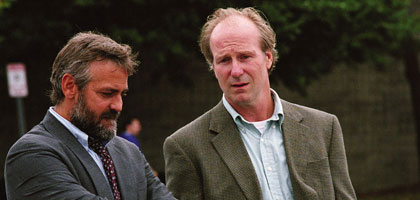
Syriana
USA 2005

Reviewed by Ryan Gilbey
Synopsis
Our synopses give away the plot in full, including surprise twists.
The US, the present. Oil company Killen wins a contract to drill in Kazakhstan. The larger company Connex, which has recently lost its rights to drill for natural gas in the Persian Gulf, moves to buy Killen. Bennett Holiday, an attorney working for the law firm Sloan Whiting, is given the task of investigating how Killen landed the contract and ensuring that the Connex-Killen merger is approved by the US Justice Department. CIA agent Bob Barnes oversees the assassination of two arms dealers in Tehran, but one of the missiles intended for use in the killing goes astray. It turns up in the clutches of a recruiter at a radical Islamic seminary, who shows it to two young labourers, Wasim and Farooq, who have recently been laid off by Connex, and whom he is attempting to recruit.
Barnes is assigned to assassinate Prince Nassir Al-Subaai, the sheikh responsible for granting the Gulf contract to a Chinese company rather than Connex. More sympathetic to US interests is Nassir's younger brother prince Meshal.
Dean Whiting, Holiday's boss, persuades Meshal's ailing father to choose his younger son as his successor. In Beruit Barnes is double-crossed and tortured by a contact. Returning to the US, he is disowned by the CIA, which portrays him as a rogue agent who went off the rails. The young son of US energy analyst Bryan Woodman is killed in an electrical accident at a party thrown by Prince Nassir's family. Nassir hires Woodman to assist him in establishing new infrastructure in the Gulf. Nassir is blown up in a US missile attack that wounds Woodman and kills Barnes, who had reached Nassir in an effort to warn him of the US assassination plot. Bennett offers up two scalps to the Justice Department in exchange for approval of the merger. The chairman of Connex is named "oilman of the year" at an industry awards ceremony. Woodman returns home. Wasim and Farooq carry out a suicide attack on a Connex-Killen freighter.
Review
Only recently has the narrative template pioneered by Robert Altman's Nashville become fashionable in US cinema. This format, with its criss-crossing characters and interweaving subplots, figured most notably in Magnolia, Traffic and Crash, with the latter two pictures aiming to emulate Altman's generation of a cumulative political commentary. One danger is that the tone of such productions can become bloated by their formalist ambitions: Traffic and Crash had an unearned air of profundity. That tendency is in evidence again in Syriana, a political thriller written and directed by Stephen Gaghan, who won an Oscar in 2001 for his Traffic screenplay.
The new film wades into the slick dealings of the oil industry, following at least 15 main characters - from an emir who can foster or thwart US interests depending on his choice of successor, to migrant labourers made redundant when a Texan oil giant loses its drilling rights in the Persian Gulf. Caught in between are Bob Barnes, a CIA agent sent to assassinate the emir's oldest son Prince Nassir; Bennett Holiday, an attorney investigating a contentious merger between two oil companies; and Bryan Woodman, an energy analyst who profits unexpectedly from a death in his family.
At first, viewers are left to sink or swim in the dense plot, though there are tip-offs to keep the inattentive up to speed. Casting Christopher Plummer as law-firm boss Dean Whiting is tantamount to giving the character horns and a pitchfork. Whiting's dismissal early on of the African-American Holiday as his "boy" advertises the latter's eventual revenge well in advance. And though Gaghan has a sinister CIA boss identify an assassination target as "one of the bad guys", most of the distinctions drawn by the film are equally crude. It's clear from their sharp suits and cutting sneers that the CIA drones who will later close ranks against a victimised agent are rotten to the bone, just as the inherent purity of the poor migrant workers crowding for work is signalled by their habit of staring innocently into the camera.
Gaghan's writing has focused on political hypocrisy, but the most pressing crisis in his work arises from his own agenda. The liberal thrust of Traffic contrasted sharply with the reactionary overtones of his earlier Rules of Engagement (2000). In Syriana, the schism is more stylistic than political. Outwardly, the picture projects an impression of fragmentation and instability to reflect the turmoil of the world it is investigating. A handheld camera, erratic editing and occasional loss of focus conspire to create the illusion of documentary; motivation remains opaque throughout the first hour, while enigmatic characters, such as the retired CIA operative played by William Hurt or the Egyptian recruiter who befriends new faces at a radical Islamic seminary, are dropped into the action like smoke bombs.
The disorientation is purely cosmetic. Soon, the same narrative arcs and thematic concerns prevalent in every corner of Hollywood cinema emerge. One American character has a dramatic change of heart; another is awarded redemption. Speeches articulating controversial or cynical viewpoints, one concerning US impressions of the Arab world, another giving the low-down on the function of corruption, spill incongruously from the mouths of otherwise ordinary men. Underpinning the tangled plot is a recurring pattern of damaged relationships between guilty fathers and wounded sons. The implication, personally and globally, is that peace is undermined by errant fathers neglecting vulnerable sons. Besides ratifying the film's patriarchal bias (Syriana features just two speaking parts for women), this is a banal conclusion from a picture that had seemed so intrigued by ambiguity.
Syriana walks a thin line between supplying an objective critique and simply smoothing out political and racial differences in a homogeneous whitewash. Gaghan shows a propensity for the former in some unusual choices, like his use of sniper-eye camera angles, forever gazing down at convoys from rooftop level, or his decision to cut away instantly from a dramatic missile attack to satellite monitors that reduce the explosion to a small blip on a featureless TV screen. At other times, the picture blands out many of its characters into abstract concepts. Whenever something catastrophic occurs, all naturalistic sound is replaced either by silence or a low electronic hum. It's a technique favoured by Michael Mann, but in Gaghan's hands the effect is neutralising, allowing any complexities to be dispersed in vague waves of empathy.
Credits
- Directed by
- Stephen Gaghan
- Produced by
- Jennifer Fox
- Michael Nozik
- Georgia Kacandes
- Written by
- Stephen Gaghan
- Based on the book entitled See No Evil by Robert Baer
- Director of Photography
- Robert Elswit
- Edited by
- Tim Squyres
- Production Designer
- Dan Weil
- Music
- Alexandre Desplat
- With
- George Clooney
- Matt Damon
- Jeffrey Wright
- Chris Cooper
- Certificate 15 127m 36s
